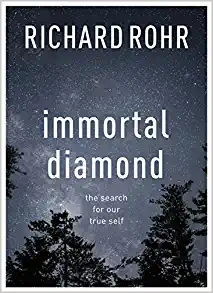This week we are discussing Chapter 6 “If It Is True, It Is True Everywhere” and Chapter 7 “Enlightenment at Gunpoint” of Richard Rohr’s book Immortal Diamond: The Search for Our True Self. The theme of chapter 6, is that whenever we put forth a truth statement, that statement must be true to all people, at all times, in all places, and in all disciplines. Rohr’s basic point is that God’s pattern and presence is everywhere and so discoverable by anyone. If we believe that “all things came into being through (the Word). . . and in him was life and the life was the light of all people” (John 1:2), that “all things were created through him and for him . . . and in him all things hold together” (Col. 1:16-17), and that “ever since the creation of the world, God’s eternal power and divine nature have been understood and seen through the things he has made” (Rom. 1:20), then we should not be surprised that the eternal nature of God and of his Word can be found in other religious and philosophical traditions and even other disciplines such as cosmology or biology. (A short comparison between those understandings that are available to all people and those which are unique to Christianity are found in St. Augustine’s Confessions. Bk.VII, ch.9.)
We see something similar to Rohr’s teachings with Paul on his missionary journeys. In these journeys, Paul finds the Truth in other traditions with which to begin his discussions. When Paul speaks to the Jews about Jesus, he shows them where Jesus is present or foretold in the Hebrew Scriptures. See, Acts 17:1-2. However, when Paul speaks to a Greek pagan audience, he quotes the Hellenistic philosophers. See, Acts 17:22-29. (In fact, some early Christian writers like Origen of Alexandria or Justin Martyr (Apology, ch.20)would assert that Plato or Socrates were really Christians in all but name.) Paul mines these universal Truth statements to advance the gospel.
C.S. Lewis has a similar point of view to Rohr. In The Abolition of Man, Lewis writes about the existence of certain core principles which are present in all ancient religions and philosophies. He calls these principles the Tao. He considers the Tao to be the objectively true values that are available to all people to discover and by which all people should abide.
Both Rohr and Lewis are Christian inclusivists and therefore understand that God is present and can be known and acknowledged in non-Christian religions and philosophical systems and that these other systems can lead to salvation insofar as they share common understandings with Christianity. The alternatives to this inclusivist position are either the exclusivist position that other religions are necessarily false because they do not specifically confess Jesus Christ or the pluralist position that all religions are equally valid by themselves. As always, during our discussions on Tuesday, feel free to disagree with Rohr’s inclusivism (tending towards pluralism).
Dinner is at 6. The menu is chicken lettuce wraps. Discussion about 6:45. Hope to see you here.
I believe the merciful God regards the lives and tempers of men more than their ideas. I believe he respects the goodness of the heart rather than the clearness of the head; and that if the heart of a man be filled (by the grace of God, and the power of his Spirit) with the humble, gentle, patient love of God and man, God will not cast him into everlasting fire prepared for the devil and his angels because his ideas are not clear, or because his conceptions are confused.
John Wesley, Sermon #125 “On Living Without God”

